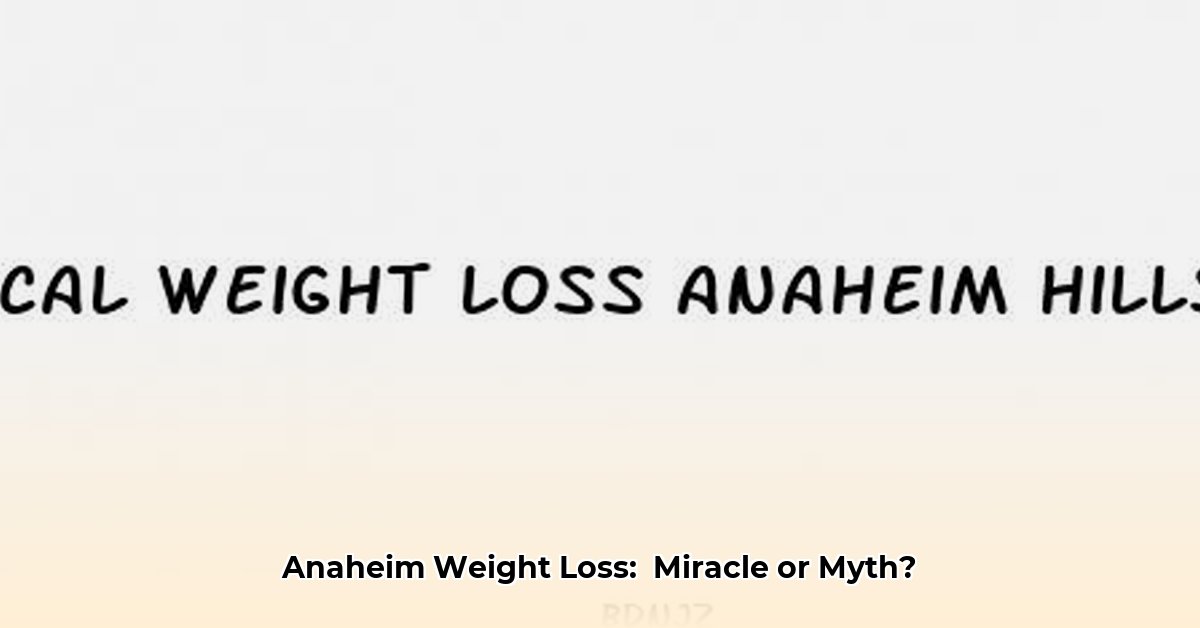
Choosing a medical weight loss clinic in Anaheim can be overwhelming. Numerous clinics offer various programs, making it difficult to discern effective, safe options from those offering unrealistic promises. This comparative review focuses on evaluating approaches and providing actionable insights to help you navigate this complex landscape. We will analyze MD Weight Loss Medical Center as a case study, highlighting both its strengths and potential drawbacks, and offer a framework for choosing a weight loss clinic that aligns with your needs and health goals.
Understanding the Anaheim Medical Weight Loss Landscape
The lack of standardized reporting across Anaheim's medical weight loss clinics makes comparing them challenging. Clinics often highlight success stories, but these rarely reflect the complete picture. Individual responses to treatment vary widely, and long-term success hinges on multiple factors beyond the clinic's approach. This article aims to provide a framework for informed decision-making, empowering you to assess different clinics and choose the best fit.
MD Weight Loss Medical Center: A Detailed Analysis
MD Weight Loss Medical Center boasts a substantial client base, exceeding 10,000 individuals. This scale suggests a significant market demand for their services. However, the absence of publicly available, detailed success rates necessitates a critical examination of their methods and potential risks.
Treatment Methods at MD Weight Loss Medical Center
MD Weight Loss employs a multifaceted approach. This likely includes appetite suppressants (medications that reduce hunger), metabolism-boosting medications (aimed at increasing calorie burn), and potentially medications used "off-label"—meaning for a purpose unapproved by regulatory bodies. While off-label use can sometimes be beneficial, it carries increased risks due to the lack of extensive clinical trials supporting its efficacy and safety for weight loss. Open communication with your physician about all potential side effects is paramount.
Reported Success, Limitations, and Potential Risks
The absence of precise, publicly disclosed success rates at MD Weight Loss highlights a broader industry challenge. This lack of transparency underscores the importance of proactive questioning and seeking clarification regarding the clinic's methodology, patient outcomes, and the potential for both benefits and adverse events.
Cost and Accessibility at MD Weight Loss
The cost of medical weight loss programs varies considerably. Factors to consider include the overall program cost, payment plan options, and the clinic's location and scheduling flexibility which impact accessibility. Exploring various financial options and scheduling arrangements is vital in finding a treatment plan that fits seamlessly into your life.
Comparing Weight Loss Approaches: A Critical Perspective
Several weight loss approaches exist, each with its own set of benefits and limitations. Some emphasize lifestyle changes (diet and exercise), while others focus heavily on medication. The most effective approach depends on individual health, preferences, and lifestyle considerations. A holistic approach combining lifestyle modifications with targeted medical interventions often yields the best long-term results.
Choosing a Weight Loss Clinic: A Patient's Checklist
Before selecting a weight loss clinic, ask these crucial questions:
- What specific treatment methods are used, and what are their potential benefits and risks?
- How are success rates measured and reported, encompassing both short-term and long-term outcomes?
- What support services are offered (e.g., nutritional counseling, behavioral therapy)?
- What is the total cost, including any potential hidden fees?
- Are client testimonials and verifiable success stories available?
A reputable clinic will openly discuss potential side effects and risks associated with any prescribed medication or treatment. Transparency should be a cornerstone in your decision-making process.
Regulatory Concerns and Ethical Considerations
The limited regulation within the medical weight loss industry underscores the importance of patient awareness and informed consent. The use of off-label medications, while sometimes medically justifiable, necessitates comprehensive discussions with your physician regarding potential risks and benefits. Greater transparency from clinics and increased regulatory oversight would improve patient safety and ethical practices.
Conclusion: Making Informed Choices for Lasting Weight Loss
Choosing a medical weight loss clinic requires diligent research and careful consideration. Don't be afraid to ask probing questions, comparing different approaches and carefully assessing the potential risks and benefits. Remember, effective weight loss often involves a balanced approach incorporating lifestyle changes and medical interventions tailored to your individual health needs. Remember to prioritize your long-term health and wellness.